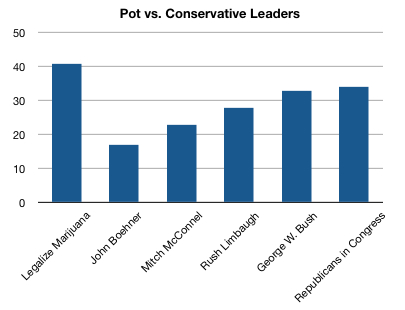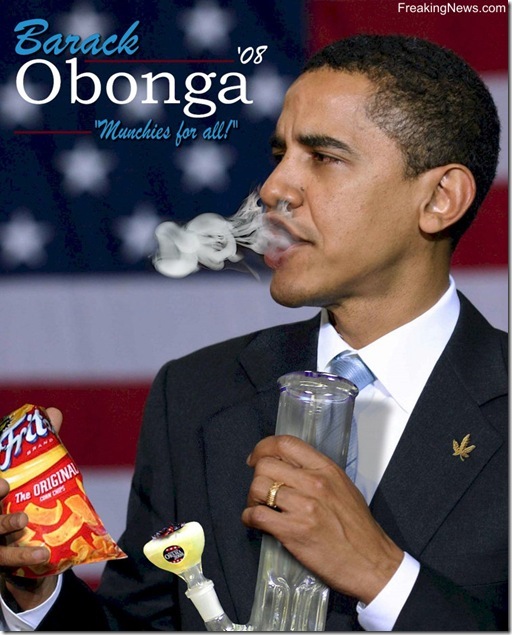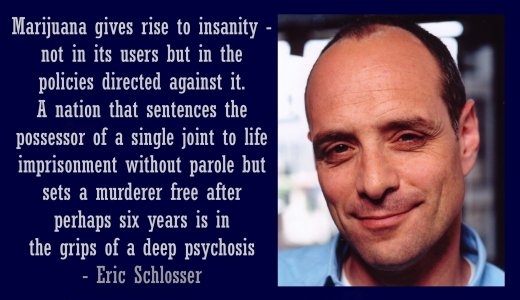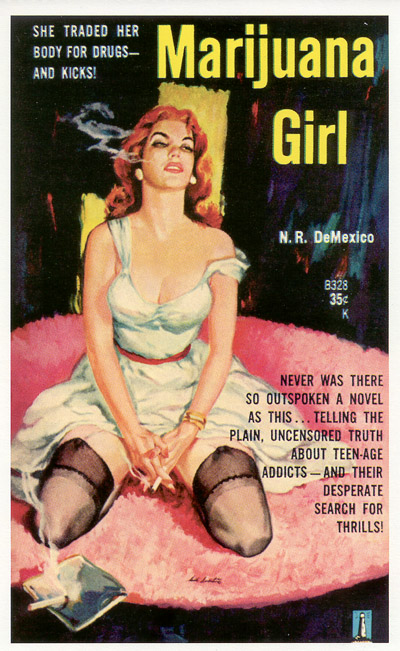YGLESIAS: Inspired by this Chris Bowers post, here’s a chart I made comparing public support for legalizing marijuana to the approval ratings for Rush Limbaugh and various Republican Party leaders that I found on PollingReport. MORE

FIVETHIRTYEIGHT.COM: The first poll, conducted last week by Rasmussen Reports, has 40 percent of Americans in support of legalizing the drug and 46 percent opposed. The second, conducted in January by CBS News, has 41 percent in favor of legalization and 52 percent against. And a third poll, conducted by Zogby on behalf of the marijuana-rights advocacy group NORML, has 44 percent of Americans in support of legalized pot and 52 percent opposed.
That all three polls show support for legalization passing through the 40 percent barrier may be significant. I  compiled a database of every past poll I could find on this subject, including a series of Gallup polls and results from the General Social Survey, and could never before find more than 36 percent of the population (Gallup in October, 2005) stating a position in favor of legalizationStill, the position no longer holds the stigma that it once did. About as many Americans now support legalizing marijuana as do de-legalizing abortion. The past three Presidents have admitted, more or less, to marijuana use. Thirteen states have some form of decriminalization on the books, while fourteen permit medical use of the drug, although it is not clear how robust those provisions are as they are superseded by federal law.
compiled a database of every past poll I could find on this subject, including a series of Gallup polls and results from the General Social Survey, and could never before find more than 36 percent of the population (Gallup in October, 2005) stating a position in favor of legalizationStill, the position no longer holds the stigma that it once did. About as many Americans now support legalizing marijuana as do de-legalizing abortion. The past three Presidents have admitted, more or less, to marijuana use. Thirteen states have some form of decriminalization on the books, while fourteen permit medical use of the drug, although it is not clear how robust those provisions are as they are superseded by federal law.
This is probably not one of those issues, however, where Washington is liable to be on the vanguard. When Barney Frank introduced a bill last year to decriminalize pot, it got only eight co-sponsors, one of whom subsequently withdrew her name. And President Obama has steered clear of any suggestion that he might move to legalize or  decriminalize pot, in spite of some earlier statements on his record to the contrary. My guess is that we’ll need to see a supermajority of Americans in favor of decriminalizing pot before the federal government would dare to take action on it. If the upward trend since 1990 holds (and recall my earlier caution: it might not), then legalization would achieve 60 percent support at some point in 2022 or 2023. About then is when things might get interesting. But I’d guess we’ll see other some other once-unthinkable things like legalized gay marriage first. MORE
decriminalize pot, in spite of some earlier statements on his record to the contrary. My guess is that we’ll need to see a supermajority of Americans in favor of decriminalizing pot before the federal government would dare to take action on it. If the upward trend since 1990 holds (and recall my earlier caution: it might not), then legalization would achieve 60 percent support at some point in 2022 or 2023. About then is when things might get interesting. But I’d guess we’ll see other some other once-unthinkable things like legalized gay marriage first. MORE
RASMUSSEN: In a new Rasmussen Reports national telephone survey, Americans are closely divided on the question of whether marijuana should be legalized: 40% say it should be, while 46% disagree. Fourteen percent (14%) are not sure which course is better. Nearly half of men (48%) say pot should be legal in this country, but just 34% of women agree. The plurality of women (49%) oppose legalization. Americans under the age of 40 are much more supportive of legalizing the drug than are older Americans. Sixty percent (60%) of Republicans are opposed to  the legalization of marijuana. Democrats are more evenly split on the question, giving legalization the edge by five points.
the legalization of marijuana. Democrats are more evenly split on the question, giving legalization the edge by five points.
This partisan divide is clear in a commentary by Froma Harrop highlighting President Obama’s support for decriminalization earlier in his political career and his choice of former Seattle Police Chief Gil Kerlikowske as his drug czar. Ms. Harrop, a columnist for the Providence Journal, says Kerlikowske “presided over a city that had virtually decriminalized small-scale possession of marijuana,” while John Walters, his predecessor during the Bush years, was much more of a hard-line drug enforcer. MORE
DENVER POST: As both the world’s largest drug consumer market and the lead voice in setting global drug policy, the United States, the Latin leaders argue, has huge responsibility now to “break the taboo” that’s suffocated open debate about the wisdom of a clearly failed 38-year “war.” The leaders are placing hopes in Obama, who as a candidate said the “war on drugs is an utter failure” and talked favorably about more public health-based  approaches. Given that history, and given this president’s openness to hearing diverse points of view, it’s hard to believe he’ll maintain the stony wall of indifference to drug policy reform that all his predecessors since Nixon have maintained.
approaches. Given that history, and given this president’s openness to hearing diverse points of view, it’s hard to believe he’ll maintain the stony wall of indifference to drug policy reform that all his predecessors since Nixon have maintained.
Still, there are crucial issues of politics and timing. One can just imagine White House advisers telling Obama to steer clear of the drug issue, that it could be as perilous and distracting as gays in the military were for President Bill Clinton in his first year in office.
Predictably, any shift will be tough. Many law enforcement agencies count on the jobs — and seizures of cash — that the drug “war” delivers. Our “prison-industrial complex,” guard unions included, remains potent. And federal law actually prohibits the drug czar from recommending legalization of any proscribed drug, no matter what his personal judgment may be. We have dug ourselves a deep hole. Only forthright and courageous leadership is likely to start us on a saner path. MORE
SFGATE: Really now, could there be a better time to decriminalize/fully legalize pot? Or, more fully, to  decriminalize pot, and then spread respectable pot shops and vending machines and dispensaries far and wide, instill quality control and decent oversight and then tax the living hell out of the glorious, stress-reducing goodness, as we stop wasting billions fighting its grand ubiquity and instead sink into profitable pools of warm, hazy progress? Don’t you already know the answer? […] Look. Is there really anyone left who doesn’t already know the “War on Drugs” is a pathetic joke, an abject failure and a taxpayer nightmare, and the only reason it survives at all is to fund the CIA and fellate the prison guard unions and support a shameful prison system, and to let politicians say they’re “tough on crime” so they can to deflect all those uninformed parents who relentlessly whine about pot in public schools just before dashing off a wine-tasting party to snort a nice line of Bolivian coke? MORE
decriminalize pot, and then spread respectable pot shops and vending machines and dispensaries far and wide, instill quality control and decent oversight and then tax the living hell out of the glorious, stress-reducing goodness, as we stop wasting billions fighting its grand ubiquity and instead sink into profitable pools of warm, hazy progress? Don’t you already know the answer? […] Look. Is there really anyone left who doesn’t already know the “War on Drugs” is a pathetic joke, an abject failure and a taxpayer nightmare, and the only reason it survives at all is to fund the CIA and fellate the prison guard unions and support a shameful prison system, and to let politicians say they’re “tough on crime” so they can to deflect all those uninformed parents who relentlessly whine about pot in public schools just before dashing off a wine-tasting party to snort a nice line of Bolivian coke? MORE

WIKIPEDIA: Eric Schlosser (born August 17, 1959) is an award-winning American journalist and author known for investigative or muckraking journalism. A number of critics have compared his work to the books and essays of Upton Sinclair. Schlosser started his career as a journalist with the The Atlantic Monthly in Boston, Massachusetts. He quickly gained recognition for his investigative pieces, earning two awards within his two years of joining the staff; he won the National Magazine Award for reporting for his two-part series “Reefer Madness” and “Marijuana and the Law” (Atlantic Monthly, August and September, 1994), and he won the Sidney Hillman Foundation award for his article, “In the Strawberry Fields” (Atlantic Monthly, November 19,1995). In addition to the Atlantic Monthly, Schlosser’s work has appeared in Rolling Stone, Vanity Fair and The Nation. Schlosser’s work has received positive reviews from across the entire political spectrum. William F. Buckley gave Reefer Madness a positive review [3], as did Business Week[4] and the Financial Times. Fortune Magazine called Fast Food Nation the “Best Business Book of the Year” in 2001. MORE

